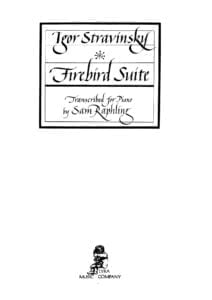Come join us now, and enjoy playing your beloved music and browse through great scores of every level and styles!
Can’t find the songbook you’re looking for? Please, email us at: sheetmusiclibrarypdf@gmail.com We’d like to help you!
Table of Contents
Stravinsky Sheet Music Library #smlpdf

Best Sheet Music download from our Library.
Stravinski, Igor – Poetica Musical Book (Spanish)
Stravinsky Ragtime (Piano Solo)
Stravinsky Ragtime (Piano Solo, Transcribed By The Composer)
Stravinsky The Firebird Suite Piano Transcription
Stravinsky – Octet for Wind Instruments
Stravinsky – Petrushka (3 movements arr. piano)
Stravinsky – Symphonie de Psalmes
Stravinsky – The Rite Of Spring – piano 2 hands – Raphling-
Stravinsky – The Rite of Spring Le Sacre du printemps (4 hands, piano à 4 mains)
Stravinsky 3 Easy pieces for piano 4 hands
Stravinsky 4 Etudes Op.7
Stravinsky And His World by Tamara Levitz (Book)
Stravinsky Firebird Piano Transcription
Stravinsky Sonata F Sharp Minor
Stravinsky Tango
Stravinsky, Igor 5 Easy Pieces [Piano 4 Hands]
Stravinsky, Igor – The Rite of Spring Le Sacre du Printemps (piano solo)
Please, subscribe to our Library.
If you are already a subscriber, please, check our NEW SCORES’ page every month for new sheet music. THANK YOU!

Stravinsky, the Best of
Tracklist: A Sagração da Primavera Primeira Parte: A Adoração da Terra 1. Introdução 2. Augúrios de Primavera / Dança das Adolescentes 3. Jogo do Rapto 4. Rondas da Primavera 5. Jogos das Tribos Rivais 6. Procissão do Sábio 7. O Sábio 8. Dança da Terra Segunda Parte: O Sacrifício
9. Introdução 10. Círculos Místicos das Adolescentes 11. Glorificação da Eleita 12. Evocação dos Ancestrais 13. Ação Ritual dos Ancestrais 14. Dança do Sacrifício. A Eleita O Pássaro de Fogo (Suíte, 1945)
15. Introdução 16. Prelúdio e Dança 17. Variações 18. Pantomima I 19. Pas-De-Deux 20. Pantomima II 21. Scherzo 22. Pantomima III. Rondó 23. Dança Infernal 24. Canção de Ninar 25. Hino Final

Please, subscribe to our Library.
If you are already a subscriber, please, check our NEW SCORES’ page every month for new sheet music. THANK YOU!

Igor Stravinsky – Short Bio
Igor Stravinsky (1882-1971) was a Russian composer who revolutionized 20th-century music, and provoked riots with The Rite of Spring.
Life and Music
Stravinsky composed masterpieces in almost every genre, most notably an incomparable series of ballet scores.
He discovered a way of rethinking the creative ideals of the 17th and 18th centuries in a thoroughly contemporary idiom and, in doing so, hit upon one of the most vital and far-reaching movements of the last 100 years: Neo-Classicism.
Without Stravinsky, the history of 20th-century music would have turned out quite differently.
Although his father was a distinguished bass singer and the young Stravinsky was given every opportunity as a child, Stravinsky hardly showed the kind of unblinkered passion for music which one normally associates with a great composer. Indeed, he looked set for a career in jurisprudence until he met Rimsky-Korsakov, who immediately recognized he had a talent for composition and offered to teach him.
Stravinsky’s big break, the ballet The Fire bird, came out of the blue. He was commissioned to compose the music only because Anatoly Lyadov let down the impresario Serge Diaghilev at the last minute.
The premiere of Stravinsky’s The Rite of Spring, in Paris in June 1913, caused a sensation, and Stravinsky was catapulted from obscurity to stardom literally overnight. The notorious performance, interrupted throughout by a hail of farmyard noises from the gallery, ended in chaos with rival factions shouting abuse at each other, and the conductor and musicians fleeing in disarray.
It is one of the miracles of Stravinsky’s output that while each and every piece could be by no one else, no two works sound remotely the same.
